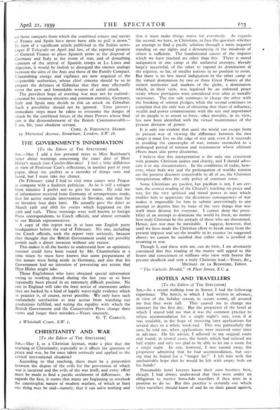CHRISTIANITY AND WAR
[To the Editor of THE SPECTATOR]
SIR,—May I, as a Christian layman, make a plea that the teaching of Christianity, especially as it affects the question of peace and war, be for once taken seriously and applied to the critical international situation?
According to that teaching, there must be a proportion between the degree of the evils for the prevention of which war is incurred and the evils of the war itself, and every effort must be made to find a pacific settlement of differences. As regards the first, it seems that many are beginning to overlook the catastrophic nature of modern warfare, of which at least one thing may be said—namely, that it can solve nothing and that it must make things worse for everybody. As regards the second, we have, as Christians, to face the question whether an attempt to find a pacific solution through a mere negative standing on our rights and a denouncing of the misdeeds of others is sufficient. The fundamental causes of the impasse which we have reached are other than this. There is moral indignation in one camp at the unilateral attempts, already large:y successful, of the other to expand its domination at the expense, so far, of smaller nations in no position to resist. But there is no less moral indignation in the other camp at the virtual domination by two or three Great Powers of the richest territories and markets of the globe, a domination which, in their view, was legalised by an enforced peace treaty whose provisions were considered ever after as morally sacrosanct. The one side continues to charge the other with the breaking of solemn pledges, while the second continues to complain that the only way of obtaining that share of influence, wealth and power commensurate with the size and importance of its people is to resort to force, siNce morality, in its view, has now been identified with the virtual maintenance of the present division of power.
It is only too evident that until the world can escape from its present way of viewing the difference between the two camps it must live on the edge of war and, even if it succeeds in avoiding the catastrophe of war, remain reconciled to a prolonged period of tension and rearmament whose ultimate effects must also prove disastrous.
I believe that this interpretation is the only one consistent with genuine Christian justice and charity, and I should advo- cate it in any circumstances. In the conditions of today, how- ever, when both war and the prolongation of warlike tension are the greatest disasters conceivable to all of us, the Christian interpretation offers the only policy of common sense.
Some Christians are pacifist, but pacifism is not, I am cer- tain, the correct reading of the Church's teaching on peace and war, for the very spiritual and moral power in man which enables him to appreciate the disastrous consequences of war makes it impossible for him to submit unresistingly to any attempt to deprive him by force of the very things that war itself must destroy for everyone. I cannot deny the possi- bility of an attempt to dominate the world by force, no matter how truly Christian be the attitude of those who are threatened. Hence, just war may be inevitable. I suggest, however, that until we have made the Christian effort to break away from the present impasse and see the trouble in its essence (as suggested above) we cannot be satisfied that either side is justified in resorting to war.
Though I, and those with me, can do little, I am absolutely convinced that this reading of the matter will appeal to the hearts and consciences of millions who view with horror the present deadlock and seek a truly Christian lead.—Yours, &c.,
MICHAEL DE LA BEDOYERE, Editor.
" The Catholic Herald," 76 Fleet Street, E.C.4.










































 Previous page
Previous page